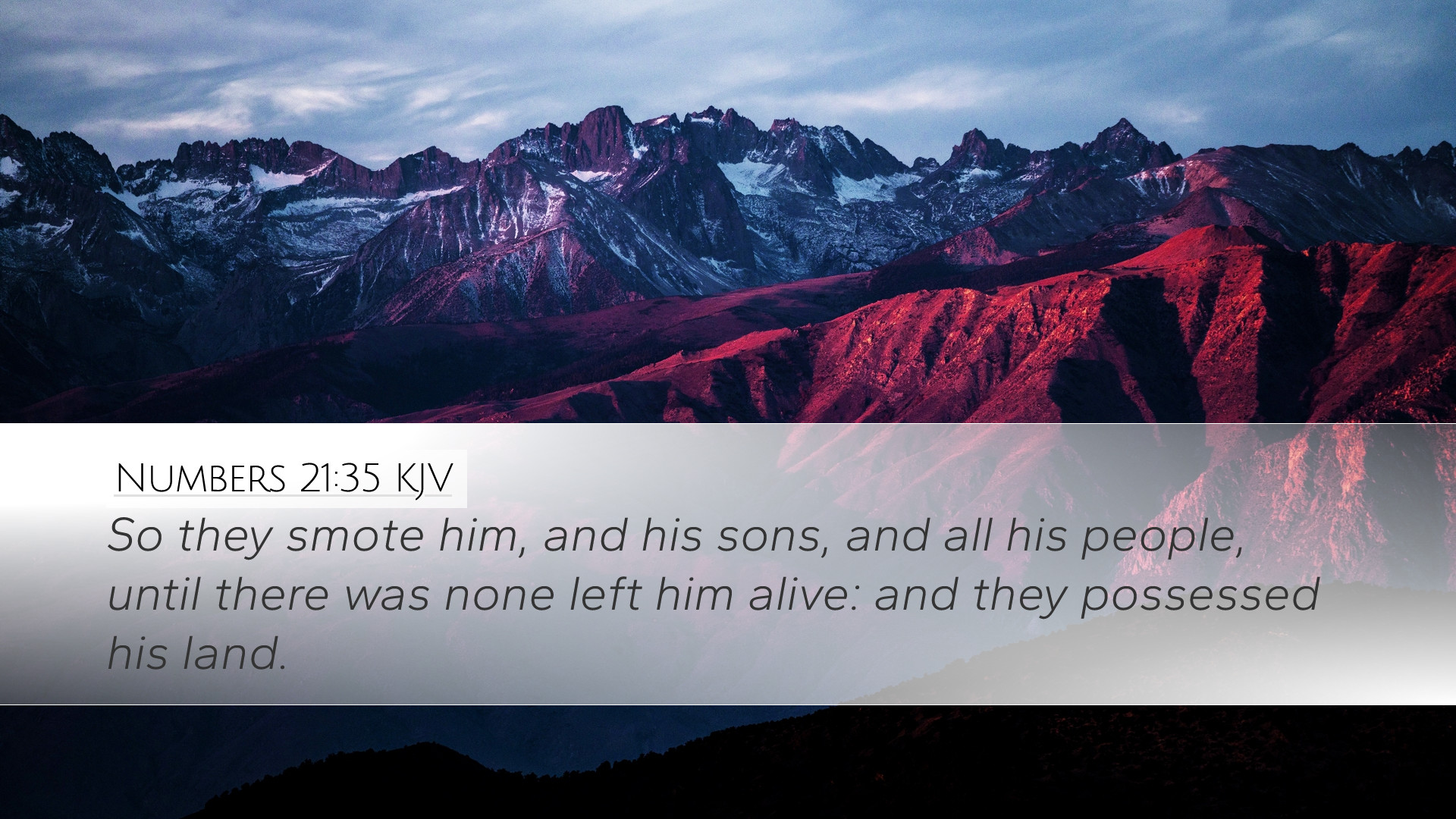Commentary on Numbers 21:35
In Numbers 21:35, we encounter a significant moment in the history of the Israelites as they continue their journey to the Promised Land. This verse encapsulates themes of divine judgment, the fulfillment of God’s promises, and the complex relationship between Israel and the surrounding nations.
Text of Numbers 21:35
“So they smote him, and his sons, and all his people, until there was none left him alive: and they possessed his land.”
The Context of the Passage
This verse is situated within the broader narrative of the Israelites' travels through the wilderness after their exodus from Egypt. At this juncture, they are engaged in battles with various kings and peoples who oppose their passage and their claim to the promised land.
Theological Reflections
This passage speaks to the inevitability of God’s judgment upon those who oppose His people. The narrative reflects the seriousness of sin and the consequences of rebellion against God’s decree.
Insights from Commentaries
-
Matthew Henry:
Henry emphasizes that the destruction of Arad, the Canaanite king, is a demonstration of God’s faithfulness in delivering Israel from its enemies. He articulates that this judgment underscores the principle that those who stand against God's purposes will ultimately face defeat.
-
Albert Barnes:
Barnes points out that the Israelite victory serves as a reminder of the covenant between God and Israel. He discusses how God empowers His people to claim what has been promised to them, indicating that this victory symbolizes the spiritual battles believers face and the ultimate triumph that is available through faith in God.
-
Adam Clarke:
Clarke delves deeper into the historical and geographical context of the Arad territory, highlighting its significance in the ancient world. He remarks that the complete annihilation of Arad's population was not merely a military strategy but a divine mandate, serving as a warning to those who oppose God’s chosen nation.
The Nature of God’s Judgment
God's judgment in this verse is severe, and it raises important questions concerning divine justice and mercy. It serves as a reminder that God is not only loving but also just. This duality of God’s character necessitates a careful understanding:
-
Divine Sovereignty:
The complete destruction of Arad showcases God's ultimate control over nations and destinies. The presence of Israel, as God's chosen nation, signifies a divine purpose that cannot be thwarted.
-
Warning to Nations:
This act of judgment stands as a historical example for future generations. It illustrates that rebellion against God and His people will not go unpunished.
Application for Today’s Believers
This verse provides valuable lessons for believers today. The victory of Israel over Arad can be seen as an encouraging reminder of God's faithfulness to those who follow Him. Key applications include:
-
Faithfulness in Adversity:
Just as Israel faced opposition, believers today may encounter struggles and challenges. This passage encourages faith in God’s deliverance.
-
The Importance of Obedience:
Israel's success was directly linked to their obedience to God's commands. They were to trust and follow the instructions given to them, emphasizing the necessity of living a life in accordance with God's will.
-
Hope in God’s Justice:
The judgment of Arad affirms the belief that God operates in justice, and ultimately, evil will be addressed. This inspires hope that God will rectify wrongs in our lives and in the world.
Conclusion
Numbers 21:35 is laden with profound significance, reflecting God’s judgment, the fulfillment of promises, and lessons in faith and obedience. Pastors, students, theologians, and scholars are reminded of the continuing relevance of this ancient story, which speaks to contemporary issues of faith, justice, and the nature of God's relationship with His people. In our pursuit of understanding, may we seek to apply the principles from this passage and uphold our commitments to God's calling upon our lives.


